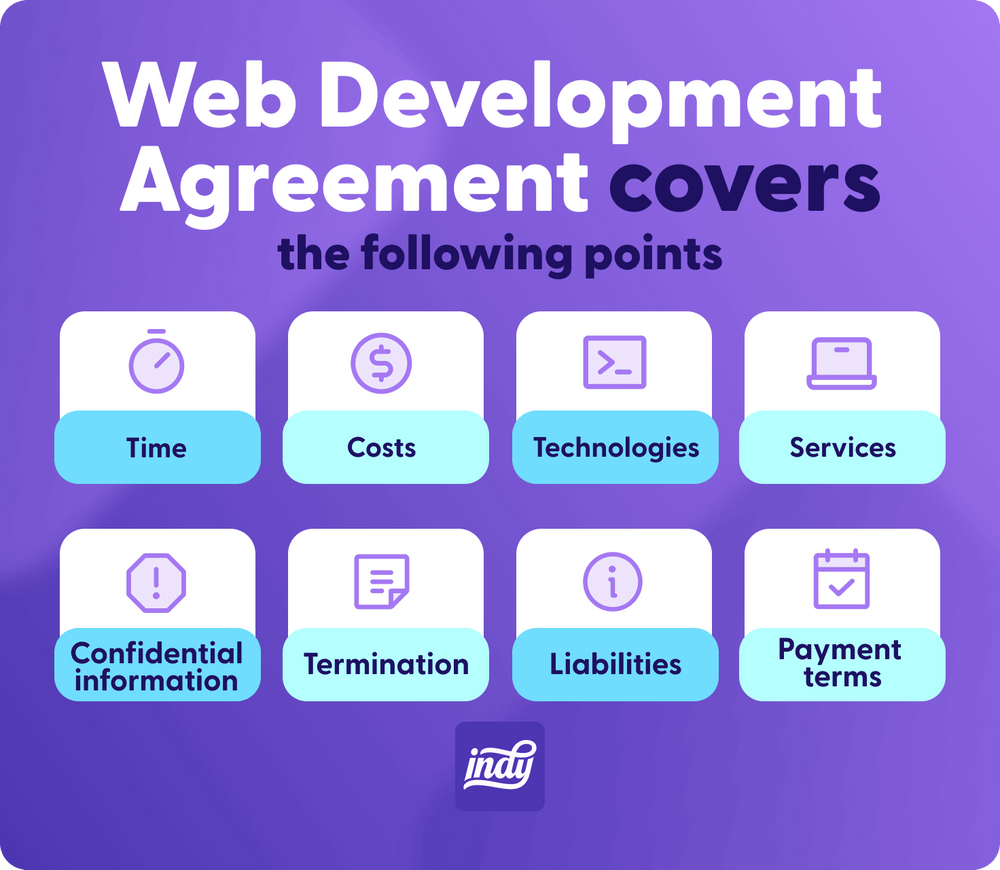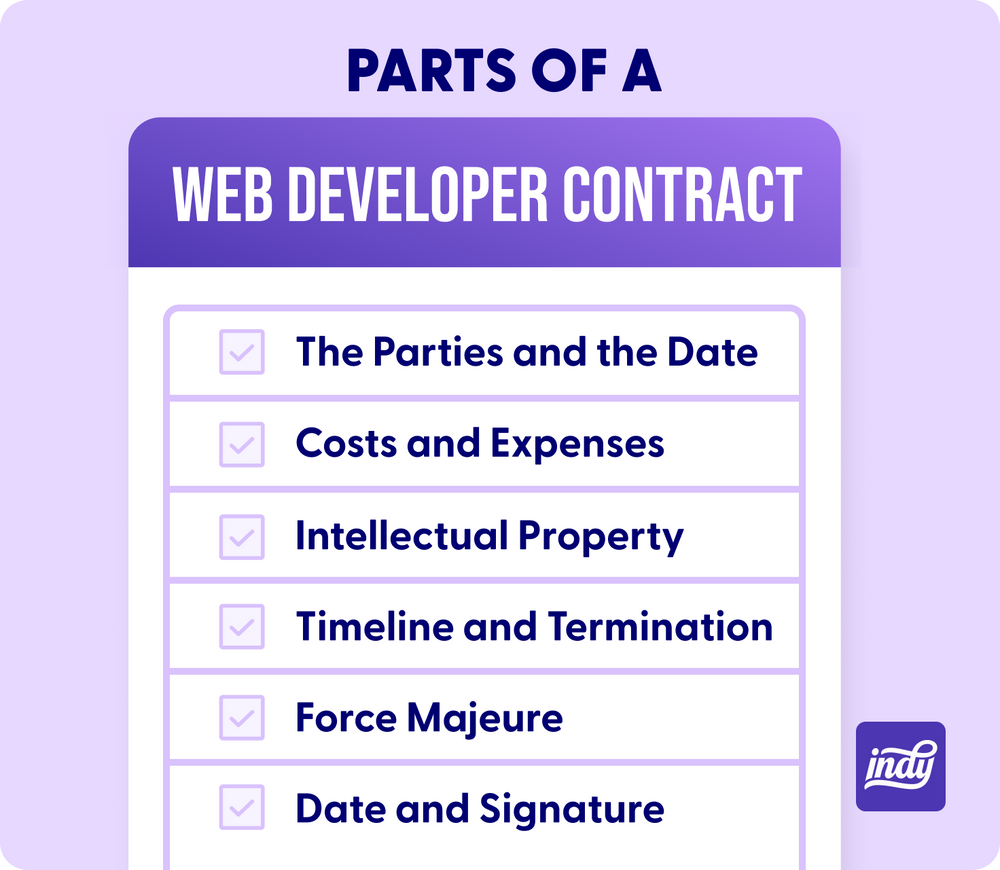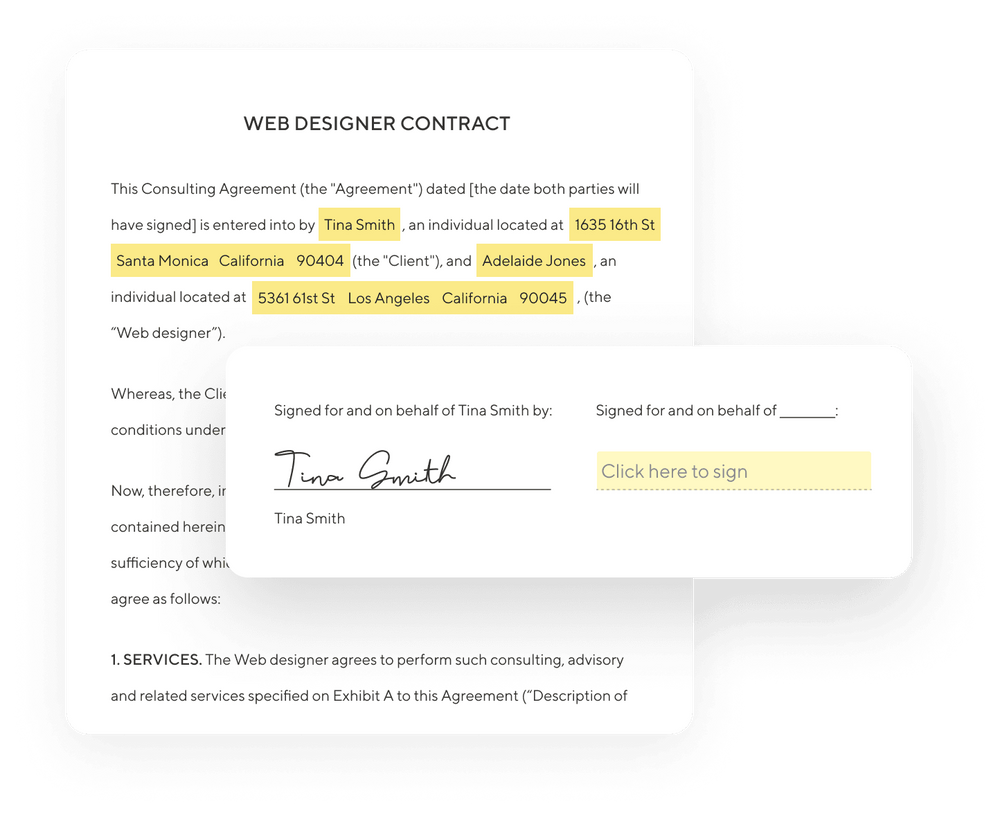Many developers choose not to work with written contracts. This doesn't necessarily mean that you can't enforce an agreement with a client if the situation arises. Verbal agreements are, after all, also contracts. However, you're more likely to receive unfavorable terms or get into a dispute with a client when you don't have adequately drafted terms.
Web development contracts are essential to protect both parties involved in a project. They define the project scope, deliverables, price, payment schedule, and any other items relevant to a website or web app job. In addition, they outline what should happen if there's a disagreement or problem between the developer and the client.
What Is a Web Developer Contract?
A web development contract is a legally binding agreement that governs the relationship between two parties. In this case, a person or business that needs web development services (web design, web services, a web app, improvements or maintenance) and a developer who can provide them.
A web development agreement can vary slightly depending on the type of website or web application required, the technologies to be used, and the scope of services, but they typically cover the following points:
- The services you will provide as a web developer, including your responsibilities and obligations.
- The total costs for all development and how each party will cover these costs.
- The deliverables, for example, finished websites or web applications.
- The technologies you will use to create the website or web app.
- Any additional materials you will use to reach the goal, such as equipment or access to specific platforms.
- The time you will require to finish the work.
- Who owns the copyrights of the resulting assets.
- The payment terms.
- How you will handle any confidential information.
- Any liabilities and steps for termination.

What Is the Goal of a Web Developer Contract?
A web development contract is a legal document that can help both the client and you align the expectations and responsibilities of a development project.
The main goal of a freelance web developer contract is to make sure the legal interests of all parties involved are protected if there's a misunderstanding or something goes wrong with the website or web app you have developed.
Parts of a Web Developer Contract
As a web developer, there are several things you must have in your website development contract. Let's go through them in detail.

The Parties and the Date
The first component of your web development agreement is to note the parties that are involved in the project proposal. You will typically need to include names, titles, and addresses. The date is also an essential part of this section. Keep in mind that you can simplify the rest of the contract by stating what other names you will use to refer to the people in the agreement.
For example:
"This web development agreement (the "Agreement”) sets up the terms and conditions upon which [Client or Company name] (the "Client"), registered address [Address], enagages [Developer name] (the "Developer"), registered address [Address] as a web developer for…”
The Web Development Work That Will Be Provided
The scope of your web development work is an essential part of your contract. This is where you should list everything you're going to do for a client. It's important to set appropriate expectations and not over-promise what you will be able to deliver. However, you should lay out everything that can be expected of you so you won't get surprise requests.
For example:
The Company's main activity is [Describe the client's activities], whereas the Developer will provide [Describe your activities].
If you omit things you know you’re going to do, you are putting yourself at risk of scope creep (when more and more tasks keep piling on, making you lose valuable time). For example, many web developers know they’re going to do browser testing. This might not be something you mention because you’re used to testing things as you go, but your client might then expect you to test a variety of browsers and devices you weren’t expecting. Other clients might expect web hosting services or a free template to be part of your offer.
Other services generally expected from web developers can include:
- The number of products you will list if you're developing an e-commerce store.
- Any proofreading of copy - especially if you're redesigning an existing site and reusing its content.
- The keyword and SEO research, including meta descriptions and tags.
- The handling of images and their alts, as well as content organization when there are hundreds of pages to develop.
- Any design changes and accessibility checks.
Be sure to mention all services you include and be as detailed as you can when you describe them. Some requests will be out of scope, but that doesn't mean you can't do them. It's best to add clauses that outline how you will handle these scope extensions and the extra costs for the client.
Don't forget also to outline deadlines and estimates for meeting your milestones. Web development projects can take considerable time, and you want to make sure you'll be paid as the work progresses.
The wording for these clauses can be something like:
All work is to be completed and reviewed by [Date].
The Developer agrees to the following milestones: [List milestones].
The Web Development Costs and Expenses
This is quite a critical section, so make sure you think about it carefully. Any web development contract should include all relevant payment details. In particular, exactly how much the work will cost, as well as a few other essential details such as:
- When the payments will be due.
- Whether you require a form of payment upfront.
- The different types of payments you can accept.
- Whether you will make payments at regular intervals.
- Who will pay for other fees and services if required.
Some projects might also require you to travel, acquire specific software or assets, buy web hosting services, and other things not covered by the initial quote. Make sure you mention all of them in your web development contract.
For example:
The Company will be invoiced through an invoicing system weekly in the amount of $[Sum]...
Another clause you should include in this section is provisions for reviews - especially if your development work includes interface or graphic design. If the client has to pay for these revisions (most developers include a few but limit their scope and duration), you should mention their cost. If not, you can include any other considerations like what happens if the client provides no feedback for a certain period of time.
Approval windows are a particularly beneficial tool for ensuring clients have a certain amount of time to accept the work done. If the window expires, the work can be considered automatically approved. Some web developers also add a "restarting fee" for when the client is not responsive and the project goes dormant. This type of clause can help clients prioritize the work they do with you and accelerate the delivery of the final product.
It's essential to define what is considered "approved" too. Clients want to have their projects done as much as you do, so a provision like this can help clarify and protect both parties.
For example:
Payment will be made within [Amount] days after receipt of the invoice. For past due invoices, a late fee of $[Sum] will apply...
If the Developer shall not hear from the Company within seven days after submission of the work, the work shall be considered accepted with no further changes permitted...
Intellectual Property and Nonexclusivity Clause
It's always better if your web development agreement contract includes information about who owns the work you will create (in particular, provisions for logos, pictures, underlying databases, functionality, and the source code) and whether you're allowed to work in other projects during the same period.
Some web developers choose to remain the author and owner of intellectual property. This means that, although the client can change to a new supplier and make changes to the app or site, they are not allowed to make copies of it or sell part of the source code to someone else. Sometimes, the client receives full ownership of the code but allows the developer to still show it as part of their portfolio.
Regardless of how you want to manage your code, it's always essential to include a clause about intellectual property, so both parties know exactly what to expect. You can also include special provisions for proprietary methods and training materials you might have used. The other thing to consider is whether you agree to an exclusive relationship between the parties or if you will be free to continue working for other clients.
For example:
All intellectual property of the work produced will become the intellectual property of the Company, as a work-made-for-hire...
Company and Consultant hereby agree that Consultant shall be free to continue working for and taking on new clients, without regard to the Company.

Confidentiality
You should always include a statement in your web development contract attesting that all information given to you by the client will remain confidential.
For example:
The Developer will maintain the confidentiality of all the Company's information, including financial information, website usage analytics, etc.
Timeline and Termination
It's also important to specify in your contract whether the development work you will do will be open-ended or month-to-month. At some point, your web development might need to be terminated. You can include a clause that defines the termination terms to anticipate this situation.
For example, you can ask the client to give you a 30 day written notice before they can terminate the agreement. It helps if you also refer to the fees and reimbursements that the client might have to pay in the event of early termination and what will happen to the work in progress.
For example:
The Parties might terminate this agreement before the specified end date by giving notice in writing [Number of days] days in advance...
This agreement may be terminated immediately in the event of a breach of the terms by either party...
Force Majeure
In the unlikely event that you might be unable to perform your development duties due to causes beyond your control (such as acts of nature or other unforeseen circumstances), it can be helpful to include a "Force Majeure" clause.
For example:
The Developer is not liable for any failure to perform due to causes beyond its reasonable control, such as natural disasters.

Other Factors
We recommend that your development contract also outlines one or more clauses around any particulars of an agreement. For example, do you require access to a client's tools? What about login information for analytics, tracking KPIs, or third-party software? Anything you might not have included in the previous parts can go in the "Other Factors" section.
Date, Signature, and Page Numbers
Remember to leave a space at the bottom of your development contract where you and your client can sign. It would be best if you also left an empty area for initials on each page.
If your agreement has multiple pages, make sure you number them.
The Benefits of Using an Indy Contract Template
If you don’t have the time or confidence to write your own web development contract from scratch, you can use a template. With Indy, you can create, send, and sign legally vetted web development contracts in minutes.
This single-stop freelancing platform provides all the tools you need for your business in one place, including an impressive selection of hundreds of contract templates, NDAs, and subcontractor agreements for web developers. Indy has one essential advantage: When you use Indy, you can connect all your contracts to a client or a project, generate electronic signatures, and save them for later use.
Summary
Development contracts should be one of the key legal documents in your toolbox. Not only can they help you define the terms of your work, the scope, and how you’re going to communicate, but they can also make sure both parties are protected.
If you want to benefit from a legally-sound contract, consider creating a free account with Indy. You can customize your agreements and start making a lasting impression with your web development clients in just minutes.



